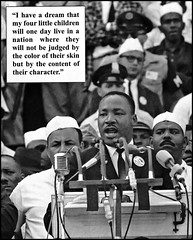Yes, Governor, Race Matters
Posting is less frequent this week because I'm traveling. -- AWO
 Sarah Palin and the NAACP have been going back-and-forth this week over whether racism has played a role in the tea parties. Instead of commenting on their debate per se, I want to clarify a misconception that many Americans hold, a belief that makes it difficult to make any progress in this debate.
Sarah Palin and the NAACP have been going back-and-forth this week over whether racism has played a role in the tea parties. Instead of commenting on their debate per se, I want to clarify a misconception that many Americans hold, a belief that makes it difficult to make any progress in this debate.
"Any good American hates racism," according to Palin. If that's the case, then Palin should explain why she thinks there are so many bad Americans.
I'm reminded of a reader who corresponded with me after the 2008 election. He passionately opposed Barack Obama's campaign. The only silver lining he could find after November 4 was that liberals could no longer argue that racism was alive in America today. I beg to differ.
Palin -- and many of her fellow tea party defenders -- assumes that racism is a ridiculous charge. They aren't calling for reinstatement of Jim Crow laws or dressing up in hoods and burning crosses. They want their children to learn about Martin Luther King, Jr., and they would never allow them to say the N-word. How can the NAACP call them racist?
Alas, discrimination doesn't always come in such an obvious package.
Sadly, researchers continue to find racial discrimination all over the place. Earlier this year at a conference at the Federal Reserve Bank of Philadelphia, economists Michael Barr, Jane Dokko, and Ben Keys presented findings from a survey of Detroit households. If you compared two homeowners -- one black, one white -- with the same creditworthiness, same default risk, same employment, same income, and same demographics, the black homeowner was twice as likely to face prepayment penalties and balloon payments (which are dangerous for unsophisticated customers on a fixed income), less likely to be approved for a mortgage, and, on average, had to pay an annual interest rate 110 basis points (1.1%) higher than his white neighbor. Even when they use a mortgage broker (who theoretically helps them get the best deal), blacks still pay $800 more than whites, after controlling for all the differences mentioned earlier.
This study comes as no surprise to students of racial relations. Year after year, experiments continue to show that whites with a criminal record are at least as likely (and often more likely) to get a job as blacks without a criminal record.
The results are so clear that you have to wonder: Is Sarah Palin saying that all these mortgage originators and employers are bad Americans, or is she simply unaware that blacks continue to suffer from racial bias in the twenty-first century?
In my experience talking to Palin supporters, the latter seems more likely. It usually takes a psychology course or two before most folks realize just how many biases we all have -- and most of them we don't even notice.
 Thought experiments are helpful to detect biases that we may be unaware of. For example, what if the Democratic vice presidential candidate were a black woman with a pregnant teenage daughter? How might Americans have treated her differently? How many pundits would blame black culture, with its hip-hop influences and deadbeat fathers? How many Republicans would think she stood for all that was wrong with America, even if they didn't say it aloud?
Thought experiments are helpful to detect biases that we may be unaware of. For example, what if the Democratic vice presidential candidate were a black woman with a pregnant teenage daughter? How might Americans have treated her differently? How many pundits would blame black culture, with its hip-hop influences and deadbeat fathers? How many Republicans would think she stood for all that was wrong with America, even if they didn't say it aloud?
If any of these questions give you pause, then Tim Wises's essay "Imagine if the Tea Party Was Black" will knock you back on your heels.
None of this is meant to choose sides in the Palin-vs.-NAACP debate. It's not even a commentary on the tea parties. It's merely an attempt to introduce some perspective into an issue that too few white Americans try to understand.
I'm not arguing about how we should respond to racism in America. I'm asking you to admit that it exists. It's a small step, but it's the only way forward.